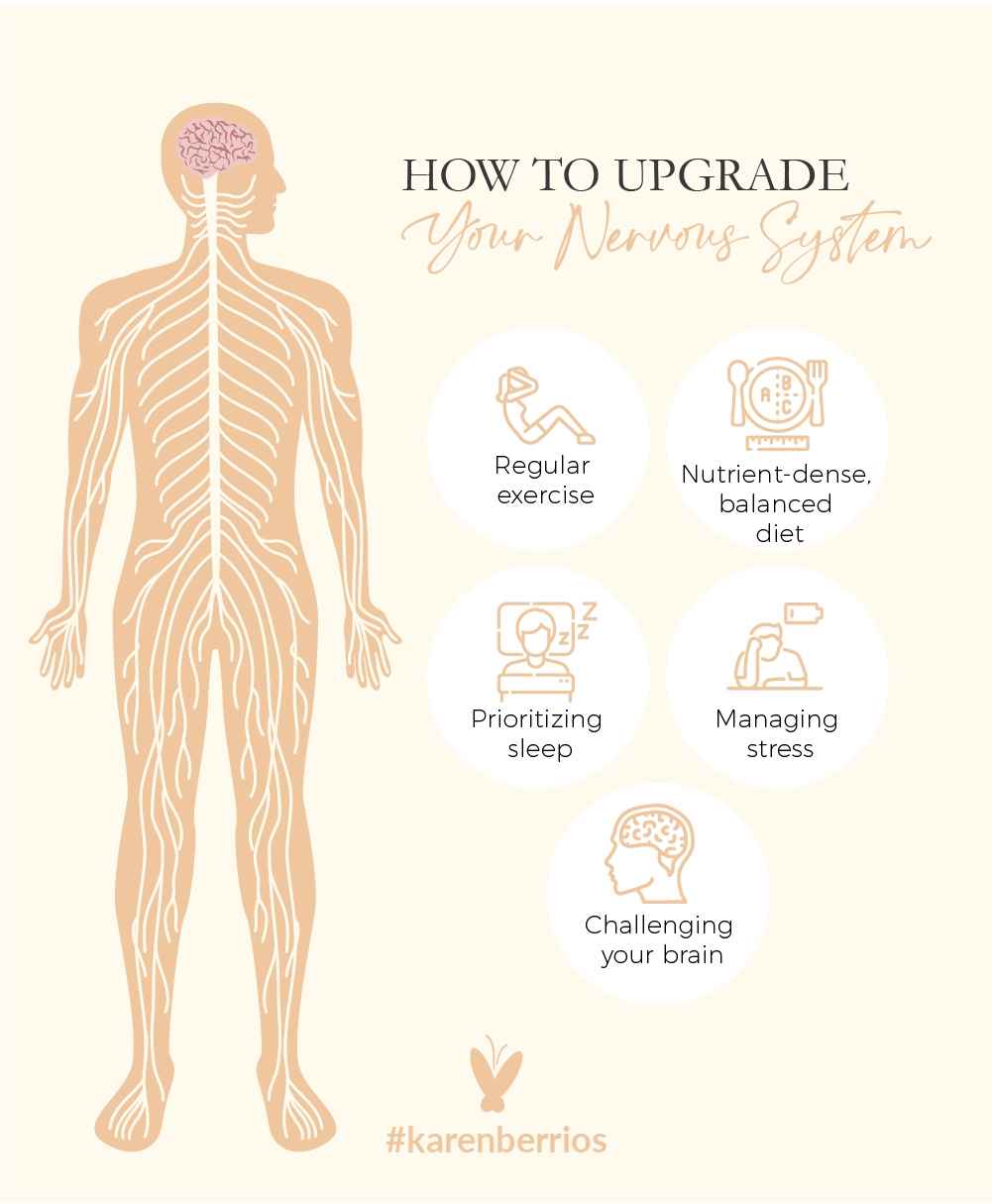

How to Upgrade Your Nervous System?
Upgrade Your Nervous System. Our nervous system is one of the most complex and important systems in the human body. It’s responsible for controlling, stimulating, optimizing, and coordinating all of the body’s functions, from breathing and digesting food to movement and thought processes. As such, it should be our greatest goal to keep it healthy and functioning at its best.
Fortunately, there are steps you can take to upgrade your nervous system and promote optimal health and well-being. In this article, we’ll mention some of the best ways to optimize the communication between your brain cells in order to get the right information to all of the other cells in your body.
The Marvel That is Our Nervous System
Our nervous system is a remarkable and complex network of cells, tissues, and organs that work together to control and coordinate the body’s functions. It plays a crucial role in maintaining homeostasis in the body, allowing us to respond to changes in our environment and adapt to different situations. Additionally, it’s also responsible for the conscious and unconscious activities that keep us alive, such as breathing, digestion, and circulation.
Our nervous system is divided into two main parts: the central nervous system (CNS) and the peripheral nervous system (PNS).
The CNS consists of the brain and spinal cord, which are responsible for processing and interpreting information received from the PNS. The brain is the command center of the nervous system, controlling all bodily functions and movements. The spinal cord is a thick bundle of nerve fibers that runs from the brain through the center of the back, carrying messages between the brain and the rest of the body.
The PNS is made up of nerves that extend from the CNS to all parts of the body, including the muscles, organs, and glands. The PNS can be further divided into two branches: the somatic nervous system and the autonomic nervous system.
The somatic nervous system controls voluntary movements and sensory information, such as touch and pain, while the autonomic nervous system regulates involuntary functions such as heart rate, digestion, and breathing. The autonomic nervous system can be further divided into the sympathetic and parasympathetic systems, which work together to maintain a balance between the body’s internal functions. This last division is usually the one we refer to when talking about stress and our nervous system.
Fight or Flight vs Rest and Digest
Our sympathetic and parasympathetic nervous system are also known as our fight-or-flight and rest-and-digest systems. The first one activates when we’re alert and stressed in order to be prepared to deal with danger, attacks, or whatever spikes our cortisol levels. The second one activates when we start to rest and unwind.
Both of these are a normal daily occurrence and as the day goes on, our parasympathetic nervous system is supposed to activate as we’re getting into rest mode and preparing for sleep. The problem we’re all facing is having an overactive sympathetic nervous system, making us unable to rest and recover fully. That’s why self-care routines and taking care of our nervous system is crucial to prevent disruptions and serious health problems.
How to Upgrade Your Nervous System
With the crazy, busy lives we all lead and the amount of stress we experience on a daily basis, our nervous system is overwhelmed, constantly alerted, and doesn’t get nearly as much recovery time as it should. We’re expected to finish all of our tasks on time, get work done, socialize, take care of our kids, and find time for self-care, but it seems like we need more than 24 hours to do all that and get at least seven to eight hours of quality sleep per night.
In this day and age, all of this seems almost impossible. That’s why it’s crucial to utilize the tools we have at our disposal to promote a better functioning nervous system and support its important actions, however we can. Here are some of the best ways to upgrade your nervous system and optimize your well-being.
Move Your Body
Physical exercise is not only good for your body, but it is also excellent for your brain and nervous system. Exercise can help promote the growth of new nerve cells and improve blood flow to the brain, optimizing inter-cell communication. It can also help reduce stress and anxiety, which can be detrimental to the nervous system. Aim for at least 30-60 minutes of moderate exercise, such as brisk walking, cycling, or swimming, at least five days a week.
Find something you enjoy doing and stay consistent. If you cannot get yourself to lace up your shoes and go for a run, try taking a pilates or a yoga class, and if you feel your best after a sweaty boxing session, join boxing classes and get your boost of endorphins.
Eat a Nutrient-Dense and Balanced Diet
A balanced diet that’s rich in macro and micronutrients is essential for the health of your nervous system. Eating foods that are rich in vitamins B12 and E, omega-3 fatty acids, and antioxidants can help promote nerve health and reduce inflammation, which can be harmful to the nervous system. Some foods that are excellent for nerve health include leafy green vegetables, nuts and seeds, fatty fish, and a whole variety of superfoods such as maca, cacao, ginger, and chia seeds.
Prioritize Sleep
Sleep is crucial for the regeneration, recovery, and repair of the nervous system. During sleep, your body repairs and restores nerve cells, which is why getting enough sleep is essential for maintaining optimal nerve function. But it’s not just about the duration, the quality of your sleep is even more important. You can be regularly getting eight+ hours of sleep, but if your quality is poor, so will be your recovery.
Aim for at least seven to eight hours of sleep per night, but try to establish a regular sleep routine and reduce all habits that impair your sleep to help improve the quality of your sleep. Avoid blue-light emitting screens and heavy foods at least an hour or two before bedtime, implement routines like meditation and reading to calm your nervous system, and make your bedroom dark and at an adequate, moderate temperature so you don’t wake up during the night or get restless.
Reduce Your Stress Levels
Stress is a natural part of life and your nervous system is built to react to it. However, high levels of stress can be extremely detrimental to the nervous system. It can cause and worsen inflammation, which can damage nerve cells and impair nerve function, aggravate your existing health conditions, and cause your nervous system to go into overload, impairing its ability to protect itself from infections, diseases, and free radicals.
To reduce stress, engage in relaxation techniques such as meditation, deep breathing exercises, physical exercise, or whatever helps you unwind. These practices can help reduce stress and promote a sense of calm, which can truly be beneficial for your nervous system.
Challenge Your Brain
Engaging in mentally stimulating activities can help promote the growth of new nerve cells and enhance cognitive function. Try reading, solving puzzles, learning a new language, or taking up a new hobby that challenges your brain. These activities can help improve brain function and promote nerve health.
Final Thoughts
Our nervous system is a complex and vital system in the body, and by taking the necessary steps to upgrade it and keep it running smoothly, it can help promote optimal health and well-being. By exercising regularly, eating a balanced diet, getting enough sleep, reducing stress, and challenging your brain, you can help promote nerve health and maintain optimal nervous system function.

hey there
I'm Karen!
I have found my cancer journey to be a positive and profound transformational experience. I’m inspired to share my healing journey here, and trust you’ll find hope, encouragement and purpose as you discover the healing power that lies within you.
Join
The Mailing List!
By signing up for my newsletter, you agree with our Privacy Policy and Terms & Conditions.



